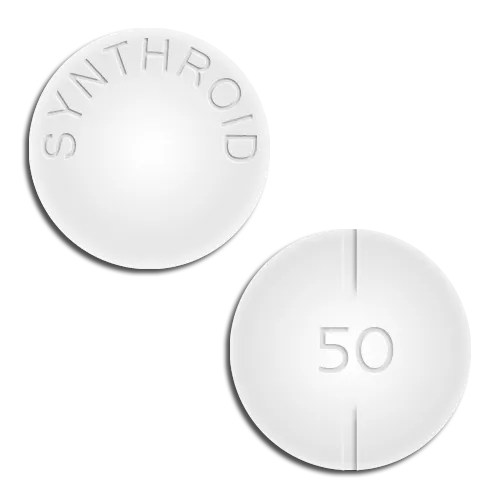Overview
Synthroid, generically known as levothyroxine, is a synthetic thyroid hormone used to treat hypothyroidism, a condition where the thyroid gland produces insufficient hormone. It normalizes metabolism, energy levels, and growth. Synthroid is also used to prevent and treat goiter, an enlarged thyroid gland, and is available in tablet form, taken once daily.
History of Development and Approval
Levothyroxine was first synthesized in the 1920s, and Synthroid was introduced in the 1950s as a reliable thyroid hormone replacement. It has been approved by the FDA for hypothyroidism and has become the most prescribed medication for thyroid disorders due to its consistent efficacy.
Key Benefits
- Thyroid Hormone Replacement: Effectively restores deficient thyroid hormone to normalize metabolism.
- Symptom Relief: Alleviates fatigue, weight gain, and depression associated with hypothyroidism.
- Goiter Prevention: Reduces thyroid gland enlargement.
- Enhanced Well-Being: Improves energy, mental clarity, and overall quality of life.
Unique Properties
Synthroid provides consistent, stable thyroid hormone replacement with a long half-life, allowing once-daily dosing. Its precise dosage strengths enable tailored treatment to meet individual patient needs.
Comparison with Similar Medications
Compared to other thyroid hormone replacements, Synthroid offers:
- Consistency: Stable hormone levels minimize fluctuations.
- Wide Dosage Range: Multiple strengths for precise titration.
- Proven Safety: Decades of clinical use with established efficacy.
Safety and Tolerability
Synthroid is generally well-tolerated when dosed correctly. Common side effects include palpitations, increased appetite, and weight loss, often due to overdosage. Rare serious effects include allergic reactions or cardiac issues. Regular monitoring of thyroid function ensures safe and optimal use.
Indications for Use
Synthroid is indicated for:
- Hypothyroidism: Replaces deficient thyroid hormone.
- Goiter: Prevents and reduces thyroid enlargement.
Dosage and Administration
Adults: Start 25–50 mcg/day, adjust to 100–200 mcg/day based on thyroid levels.
Children: Weight-based, typically 2–6 mcg/kg/day.
Elderly: Start low (12.5–25 mcg/day), titrate cautiously.
Timing: Morning on empty stomach, 30–60 minutes before food.
Notes: Regular thyroid tests for dose adjustment; avoid calcium/iron supplements near dose.
Mechanism of Action
Levothyroxine replaces deficient thyroid hormone, normalizing metabolic processes, energy production, and growth regulated by thyroid hormones.
Composition
Active Ingredient: Levothyroxine sodium, synthetic thyroid hormone.
Inactive Ingredients: Lactose, magnesium stearate, acacia for tablet stability.
Side Effects
Common: Palpitations, increased appetite, weight loss, insomnia (often from overdosage).
Rare: Hair loss, tremor.
Serious: Allergic reactions, cardiac arrhythmias require urgent care.
Prevention of Side Effects
Regular thyroid function tests, start low and titrate slowly, monitor for overdosage symptoms. Report persistent issues promptly.
Contraindications
Avoid in uncorrected adrenal insufficiency, acute myocardial infarction, or hyperthyroidism.
Warnings and Precautions
Monitor thyroid function, adjust dose in elderly or cardiac patients. Caution in pregnancy to avoid fetal harm.
Drug Interactions
Reduces absorption with calcium/iron supplements; warfarin increases bleeding risk; antidepressants may alter effects. Disclose all medications.
Overdose
Symptoms: hyperthyroidism signs like palpitations, tremors, weight loss. Seek emergency care immediately.
Pharmacokinetics
Absorption: Variable, 40–80%, peak 4–6 hours.
Distribution: Highly protein-bound.
Metabolism: Liver deiodination to T3.
Elimination: Urine/feces; half-life 6–7 days (euthyroid), varies in thyroid status.
Dosage Forms
Tablets (25, 50, 75, 88, 100, 112, 125, 137, 150, 175, 200, 300 mcg) for flexible administration.
Pregnancy and Breastfeeding
Safe in pregnancy (Category A); essential for hypothyroid mothers. Minimal milk excretion, safe for breastfeeding with monitoring.
Storage
Store at 20°C–25°C (68°F–77°F), dry, light-protected, away from children. Dispose expired properly.
Clinical Evidence
Trials confirm Synthroid’s efficacy in normalizing thyroid levels, alleviating hypothyroidism symptoms, and preventing goiter with consistent, long-term use.
Conclusion
Synthroid is a reliable thyroid hormone replacement for hypothyroidism and goiter, offering consistent efficacy and flexible dosing. Adhere to prescribed regimens, monitor effects, and consult providers for optimal outcomes.




